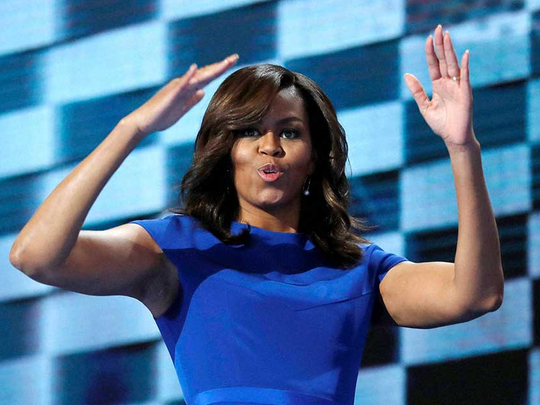
I hadn’t planned to vote.
It’s true, even in this year of the apocalyptic possibility of Donald Trump becoming the President of the United States, this American expatriate voter wasn’t going to bother — until a speech changed my mind.
It’s not that I support Trump. In a quirk of American democracy, coming as I do from the one state in the United States that has never voted Republican in more than 40 years, my ballot would make not one iota of difference. In addition, I have qualms about Hillary Clinton. As an expat in a volatile world, I’m concerned about her not-infrequently bellicose diplomacy record and hawkish military preferences. So, I reasoned, why cast an irrelevant vote for a candidate whose foreign policy leanings trouble my conscience?
That was before Michelle Obama’s speech on Monday night.
Halfway through, I found myself in solemn awe, and deeply moved. Over the great opportunity and honour I have ... to vote for Hillary.
I wasn’t the only US citizen whose plans Michelle changed that evening. Much of the audience right in front of her in Philadelphia was vocally pro-Bernie Sanders, hostile towards what Michelle planned to ask them to do, with many feeling that Hillary’s people had rigged the system. How did Michelle persuade most of them to get behind Hillary, and me to change my plans? In 14 minutes, no less?
Michelle used powerful persuasive techniques. Her speech leveraged classic tools for building trust and influencing a hostile audience to change its views. She was authentic, she found common ground and language and she employed ancient techniques of rhetoric.
First, and most important, she was herself. Michelle didn’t try to act or sound like someone else. She told stories that came from the heart — even when at odds with her expected public image. Instead of recalling a victory high after winning the 2008 election, she revisited, as a mother, her panicked “what have we done?” on seeing her daughters surrounded by “big men with guns” on their first trip to school from the White House. The audience knew that it was going to be able to trust what she said. This wasn’t First Lady spin; this was a mother’s heart.
Her emotion felt real and at times raw. We felt her pain as the descendant of slaves and her wonder at America’s promise when she said, “Today I wake up every morning in a house that was built by slaves and I watch my daughters, two beautiful, intelligent, black young women playing with their dogs on the White House lawn”.
Critically, she spent time at the beginning, bonding with her audience. Michelle began her speech like an old friend who’s come by to chat: “Remember how I told you ...?” she began, refreshing her audience’s memory of her comments eight years before. They and Michelle were now standing together, on common ground — no distance between them.
She spoke in accessible, plain language and kept it alive with life-like images. The little black boy, “his eyes wide with hope”, who wanted to touch the President’s hair; how when you’re president, you have “the nuclear codes at your fingertips”.
Aristotle would have approved: She used techniques he had outlined thousands of years ago in his treatise, Rhetoric. Use ethos, pathos and logos to persuade, he advised. In other words: Lead them with your character, move them through their hearts and convince them with logic. Underscoring her character, she spoke of the responsibility that she and President Barack Obama felt towards their children and all children to serve as role models. She moved the hearts of the audience when she spoke of the “lash of bondage, the shame of servitude, the sting of segregation” in America’s slave-owning past. And she stressed logic in the need for a steady personality to lead the nation’s powerful military and nuclear arsenal.
As students of Rhetoric know, it’s nearly impossible to shift an audience to go against its dearest beliefs — in the case of much of the Democratic National Convention, the belief that Sanders should be the Democrat’s nominee. So Michelle didn’t try. Instead, she reframed the issue at hand as one of unity for the sake of children. She said the election was “About one thing, and one thing only: It’s about leaving something better for our kids”. It was about how “we are always stronger together”.
Normally, a persuasive speech will counter the other side’s arguments. Michelle did this, but wisely took an approach that every business marketer and political adviser knows well: When you’re the leader in a tough competition, never mention the competitor by name. So, instead of mentioning Sanders — who at one point had threatened to upend the convention — she only stressed the need for “all of us coming together”. When it came to Trump, she derided traits that just happened to fit him well: Having a “thin skin or a tendency to lash out” and having complex policy issues “boiled down to 140 characters”.
More powerfully, she contradicted his language directly: “Don’t let anyone ever tell you that this country isn’t great ... Because this, right now, is the greatest country on earth!”
At that moment, it wasn’t about Trump or even Sanders. It was about being the “greatest country”, a deeply flawed one that unites for its future.
Michelle is voting for Hillary, for her daughters’ sake and for all children. I’ll be right there with her.
Jody Johannessen is a member of the faculty at Zayed University, Dubai, where she teaches Intercultural Communications and Public Speaking and Persuasion. She and Michelle Obama were classmates at Princeton University.










